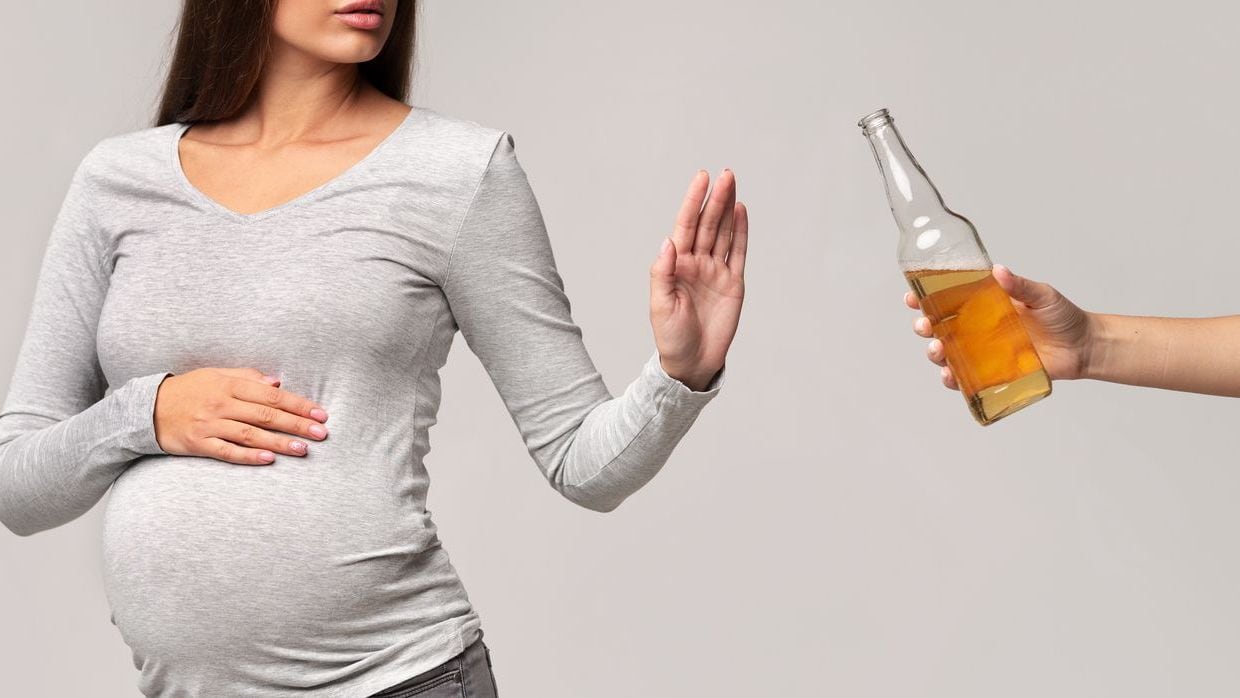Key points
- Alcohol use can be harmful during pregnancy.
- There is no known safe amount of alcohol use during pregnancy.
- There is no safe time during pregnancy to drink alcohol.
- All types of alcohol can be harmful, including red or white wine, beer, and liquor.

Why it's important
Alcohol use during pregnancy is associated with an increased risk of miscarriage, preterm birth, stillbirth, and sudden infant death syndrome (SIDS). Alcohol use during pregnancy can cause a range of lifelong behavioral, intellectual, and physical disabilities known as fetal alcohol spectrum disorders (FASDs).
During pregnancy, alcohol can pass from the pregnant woman to the fetus and affect its development. Not all babies will be affected by alcohol during pregnancy. However, it is impossible to know which babies will be affected.
There is no safe time for alcohol use during pregnancy. Alcohol can cause problems for the baby throughout pregnancy, including before a woman knows she is pregnant. Alcohol use in the first 3 months of pregnancy can cause the baby to have abnormal facial features. Growth and central nervous system problems (for example, low birthweight, behavioral problems) can occur from alcohol use anytime during pregnancy. The baby's brain is developing throughout pregnancy and can be affected by exposure to alcohol at any time.
It is never too late to stop alcohol use during pregnancy. Stopping alcohol use will improve the baby's health and well-being.

Common questions
I just found out I'm pregnant. I've stopped drinking now, but I was drinking in the first few weeks before I knew I was pregnant. What should I do now?
The most important thing is that you have completely stopped alcohol use after learning of your pregnancy. It is never too late to stop alcohol use during pregnancy. Because brain growth takes place throughout pregnancy, stopping alcohol use will improve the baby's health and well-being. Make sure you get regular prenatal checkups.
If you used any amount of alcohol while you were pregnant, talk with your child's healthcare provider as soon as possible and share your concerns.
I drank wine during my last pregnancy and my baby turned out fine. Why shouldn't I drink again during this pregnancy?
Every pregnancy is different. Alcohol use during pregnancy might affect one baby more than another. You could have one child who is born healthy and another child who is born with problems. There is no known safe amount of alcohol use during your pregnancy or when you are trying to get pregnant. There is also no safe time for alcohol use during pregnancy.
What CDC is doing
CDC works with partners across the country to address alcohol and other substance use during pregnancy and FASDs. These scientific findings help inform evidence-based care and resources. They collaborate to provide training to healthcare professionals and disseminate updated information.
Resources
If you are pregnant or trying to get pregnant and cannot stop drinking, get help! Contact your healthcare provider, local Alcoholics Anonymous, or local alcohol treatment center.
SAMHSA Treatment Locator — FindTreatment.gov
The Substance Abuse and Mental Health Services Administration (SAMHSA) has a treatment facility locator. This locator helps people find drug and alcohol treatment programs in their area.
NIAAA Alcohol Treatment Navigator
The National Institute on Alcohol Abuse and Alcoholism (NIAAA) has an Alcohol Treatment Navigator. The Navigator helps adults find alcohol treatment for themselves or an adult loved one.
Alcoholics Anonymous (A.A.)
Alcoholics Anonymous® is a fellowship of men and women who share their experience, strength and hope with each other that they may solve their common problem and help others to recover from alcoholism. Locate an A.A. program near you.
FASD Family Navigator
A program of FASD United (formerly NOFAS), the Family Navigator provides expert, confidential support and referrals to individuals living with FASDs and their family members and caregivers. This includes women who are pregnant or intending to become pregnant who might have questions about alcohol or substance use. The service is free and does not require a referral. An FASD Family Navigator can be reached to provide one-on-one support from 9 a.m. to 10 p.m. Eastern time Monday through Friday via phone or by completing an online support request form. FASD United also has a searchable resource directory.
